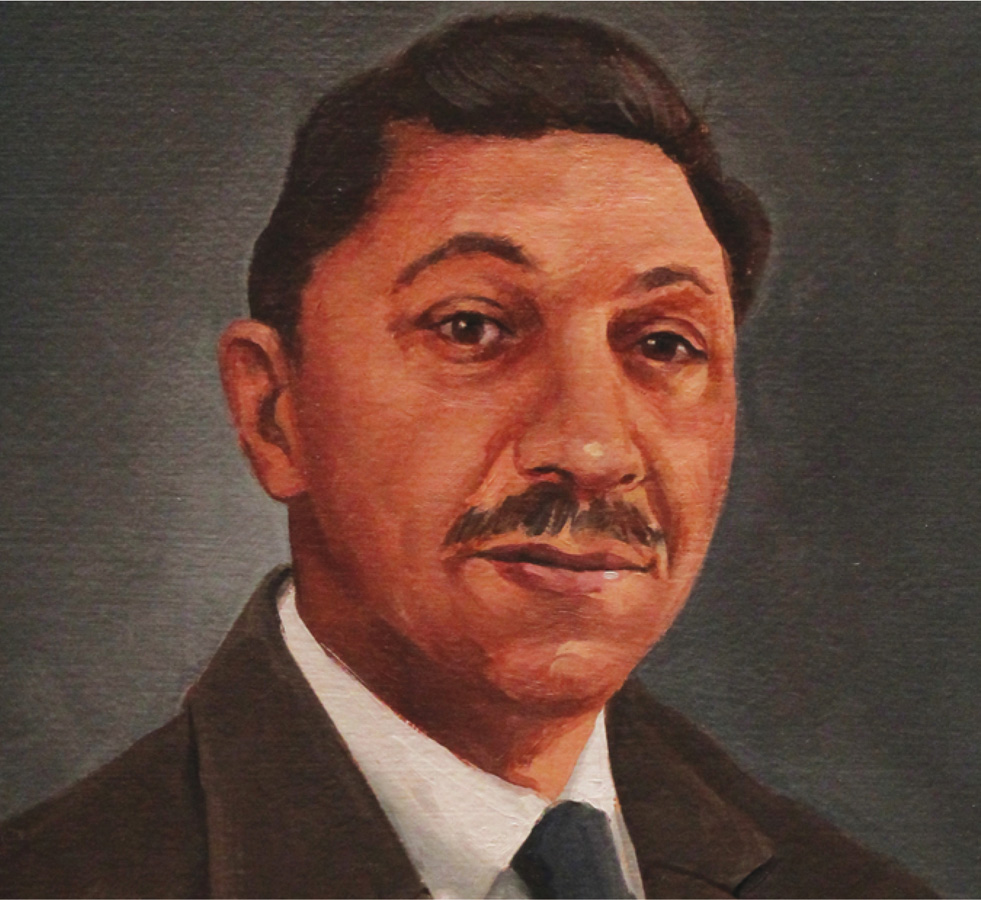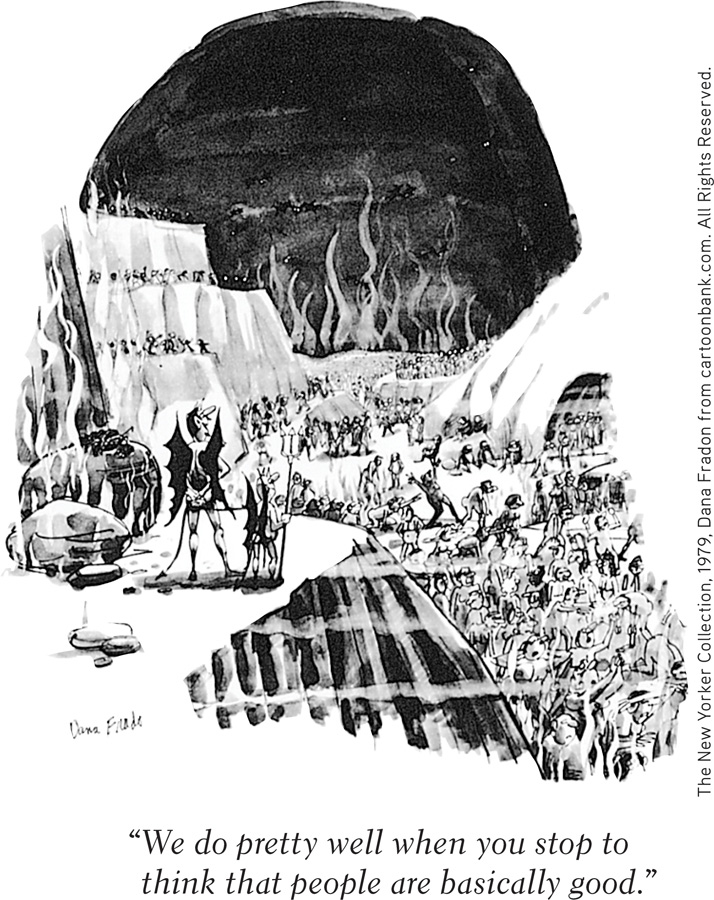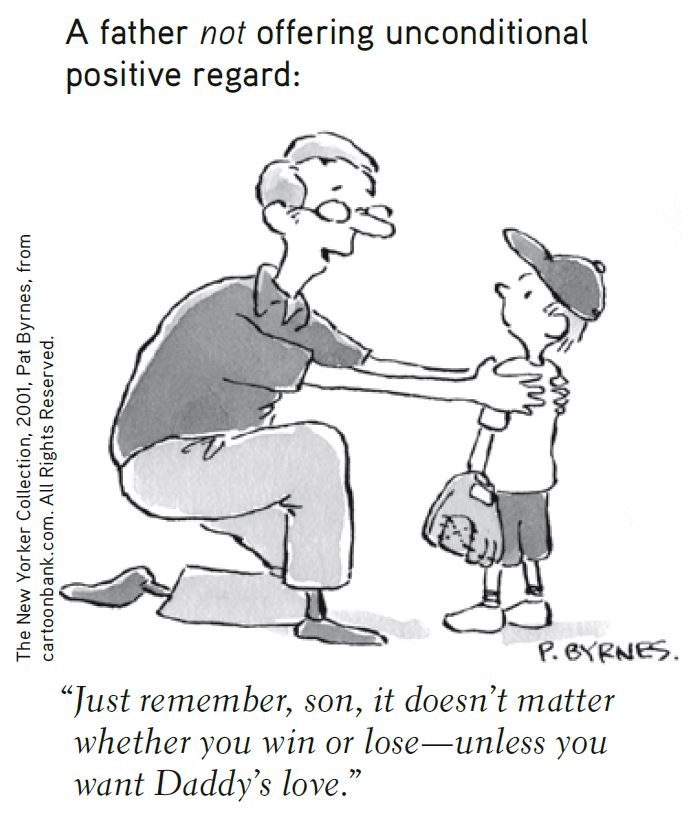47.1 Humanistic Theories
47-1 How did humanistic psychologists view personality, and what was their goal in studying personality?
By the 1960s, some personality psychologists had become discontented with the sometimes bleak focus on drives and conflicts in psychodynamic theory and the mechanistic psychology of B. F. Skinner’s behaviorism. In contrast to Sigmund Freud’s emphasis on disorders born out of dark conflicts, these humanistic theorists focused on the ways people strive for self-determination and self-realization. In contrast to behaviorism’s scientific objectivity, they studied people through their own self-reported experiences and feelings.

Abraham Maslow “Any theory of motivation that is worthy of attention must deal with the highest capacities of the healthy and strong person as well as with the defensive maneuvers of crippled spirits” (Motivation and Personality, 1970, p. 33).
Two pioneering theorists—Abraham Maslow (1908-1970) and Carl Rogers (1902–1987)—offered a third-force perspective that emphasized human potential.
Abraham Maslow’s Self-Actualizing Person
Maslow proposed that we are motivated by a hierarchy of needs. If our physiological needs are met, we become concerned with personal safety; if we achieve a sense of security, we then seek to love, to be loved, and to love ourselves; with our love needs satisfied, we seek self-esteem. Having achieved self-esteem, we ultimately seek self-actualization (the process of fulfilling our potential) and self-transcendence (meaning, purpose, and communion beyond the self).
Maslow (1970) developed his ideas by studying healthy, creative people rather than troubled clinical cases. He based his description of self-actualization on a study of those, such as Abraham Lincoln, who seemed notable for their rich and productive lives. Maslow reported that such people shared certain characteristics: They were self-aware and self-accepting, open and spontaneous, loving and caring, and not paralyzed by others’ opinions. Secure in their sense of who they were, their interests were problem-centered rather than self-centered. They focused their energies on a particular task, one they often regarded as their mission in life. Most enjoyed a few deep relationships rather than many superficial ones. Many had been moved by spiritual or personal peak experiences that surpassed ordinary consciousness.
These, said Maslow, are mature adult qualities found in those who have learned enough about life to be compassionate, to have outgrown their mixed feelings toward their parents, to have found their calling, to have “acquired enough courage to be unpopular, to be unashamed about being openly virtuous.” Maslow’s work with college students led him to speculate that those likely to become self-actualizing adults were likable, caring, “privately affectionate to those of their elders who deserve it,” and “secretly uneasy about the cruelty, meanness, and mob spirit so often found in young people.”
Carl Rogers' Person-Centered Perspective
Fellow humanistic psychologist Carl Rogers agreed with much of Maslow’s thinking. Rogers’ person-centered perspective held that people are basically good and are endowed with self-actualizing tendencies. Unless thwarted by an environment that inhibits growth, each of us is like an acorn, primed for growth and fulfillment. Rogers (1980) believed that a growth-promoting climate required three conditions.
- Genuineness: When people are genuine, they are open with their own feelings, drop their facades, and are transparent and self-disclosing.
- Acceptance: When people are accepting, they offer unconditional positive regard, an attitude of grace that values us even knowing our failings. It is a profound relief to drop our pretenses, confess our worst feelings, and discover that we are still accepted. In a good marriage, a close family, or an intimate friendship, we are free to be spontaneous without fearing the loss of others’ esteem.
- Empathy: When people are empathic, they share and mirror other’s feelings and reflect their meanings. “Rarely do we listen with real understanding, true empathy,” said Rogers. “Yet listening, of this very special kind, is one of the most potent forces for change that I know.”

The picture of empathy Being open and sharing confidences is easier when the listener shows real understanding. Within such relationships we can relax and fully express our true selves. Consider a conversation when you knew someone was waiting for their turn to speak instead of listening to you. Now consider the last time someone heard you with empathy. How did those two experiences differ?
Genuineness, acceptance, and empathy are, Rogers believed, the water, sun, and nutrients that enable people to grow like vigorous oak trees. For “as persons are accepted and prized, they tend to develop a more caring attitude toward themselves” (Rogers, 1980, p. 116). As persons are empathically heard, “it becomes possible for them to listen more accurately to the flow of inner experiencings.”
Writer Calvin Trillin (2006) recalled an example of parental genuineness and acceptance at a camp for children with severe disorders, where his wife, Alice, worked. L., a “magical child,” had genetic diseases that meant she had to be tube-fed and could walk only with difficulty. Alice recalled,
One day, when we were playing duck-duck-goose, I was sitting behind her and she asked me to hold her mail for her while she took her turn to be chased around the circle. It took her a while to make the circuit, and I had time to see that on top of the pile [of mail] was a note from her mom. Then I did something truly awful…. I simply had to know what this child’s parents could have done to make her so spectacular, to make her the most optimistic, most enthusiastic, most hopeful human being I had ever encountered. I snuck a quick look at the note, and my eyes fell on this sentence: “If God had given us all of the children in the world to choose from, L., we would only have chosen you.” Before L. got back to her place in the circle, I showed the note to Bud, who was sitting next to me. “Quick. Read this,” I whispered. “It’s the secret of life.”
Maslow and Rogers would have smiled knowingly. For them, a central feature of personality is one’s self-concept—all the thoughts and feelings we have in response to the question, “Who am I?” If our self-concept is positive, we tend to act and perceive the world positively. If it is negative—if in our own eyes we fall far short of our ideal self—said Rogers, we feel dissatisfied and unhappy. A worthwhile goal for therapists, parents, teachers, and friends is therefore, he said, to help others know, accept, and be true to themselves.
Assessing the Self
47-2 How did humanistic psychologists assess a person’s sense of self?
Humanistic psychologists sometimes assessed personality by asking people to fill out questionnaires that would evaluate their self-concept. One questionnaire, inspired by Carl Rogers, asked people to describe themselves both as they would ideally like to be and as they actually are. When the ideal and the actual self are nearly alike, said Rogers, the self-concept is positive. Assessing his clients’ personal growth during therapy, he looked for successively closer ratings of actual and ideal selves.
Some humanistic psychologists believed that any standardized assessment of personality, even a questionnaire, is depersonalizing. Rather than forcing the person to respond to narrow categories, these humanistic psychologists presumed that interviews and intimate conversation would provide a better understanding of each person’s unique experiences.
Evaluating Humanistic Theories
47-3 How have humanistic theories influenced psychology? What criticisms have they faced?
As with Freud’s psychoanalytic theory, the impact of humanistic psychology has been pervasive. Maslow’s and Rogers’ ideas have influenced counseling, education, child raising, and management. And they laid the groundwork for today’s scientific positive psychology.
They have also influenced—sometimes in unintended ways—much of today’s popular psychology. Is a positive self-concept the key to happiness and success? Do acceptance and empathy nurture positive feelings about oneself? Are people basically good and capable of self-improvement? Many people answer Yes, Yes, and Yes. In 2006, U.S. high school students reported notably higher self-esteem and greater expectations of future career success than did students living in 1975 (Twenge & Campbell, 2008). Given a choice, today’s North American collegians mostly say they’d rather get a self-esteem boost, such as a compliment or good grade on a paper, than enjoy a favorite food or sexual activity (Bushman et al., 2011). Humanistic psychology’s message has been heard.
The prominence of the humanistic perspective set off a backlash of criticism. First, said the critics, its concepts are vague and subjective. Consider Maslow’s description of self-actualizing people as open, spontaneous, loving, self-accepting, and productive. Is this a scientific description? Or is it merely a description of the theorist’s own values and ideals? Maslow, noted M. Brewster Smith (1978), offered impressions of his own personal heroes. Imagine another theorist who began with a different set of heroes—perhaps Napoleon, John D. Rockefeller, Sr., and Donald Trump. This theorist would likely describe self-actualizing people as “undeterred by others’ needs and opinions,” “motivated to achieve,” and “comfortable with power.”
Critics also objected to the idea that, as Rogers put it, “The only question which matters is, ‘Am I living in a way which is deeply satisfying to me, and which truly expresses me?’” (quoted by Wallach & Wallach, 1985). This emphasis on individualism—trusting and acting on one’s feelings, being true to oneself, fulfilling oneself—could lead to self-indulgence, selfishness, and an erosion of moral restraint (Campbell & Specht, 1985; Wallach & Wallach, 1983). Imagine working on a group project with people who refuse to complete any task that is not deeply satisfying or does not truly express their identity.

Humanistic psychologists reply that a secure, nondefensive self-acceptance is actually the first step toward loving others. Indeed, people who feel intrinsically liked and accepted—for who they are, not just for their achievements—exhibit less defensive attitudes (Schimel et al., 2001). Those feeling liked and accepted by a romantic partner report being happier in their relationships and acting more kindly toward their partner (Gordon & Chen, 2010).
A final accusation leveled against humanistic psychology is that it is naive, that it fails to appreciate the reality of our human capacity for evil. Faced with climate change, overpopulation, terrorism, and the spread of nuclear weapons, we may become apathetic from either of two rationalizations. One is a starry-eyed optimism that denies the threat (“People are basically good; everything will work out”). The other is a dark despair (“It’s hopeless; why try?”). Action requires enough realism to fuel concern and enough optimism to provide hope. Humanistic psychology, say the critics, encourages the needed hope but not the equally necessary realism about evil.
RETRIEVAL PRACTICE
- How did humanistic psychology provide a fresh perspective?
This movement sought to turn psychology’s attention away from drives and conflicts and toward our growth potential, with a focus on the way healthy people strive for self-determination and self-realization, which was in contrast to Freudian theory and strict behaviorism.
- What does it mean to be empathic? How about self-actualized? Which humanistic psychologists used these terms?
To be empathic is to share and mirror another person’s feelings. Carl Rogers believed that people nurture growth in others by being empathic. Abraham Maslow proposed that self-actualization is the motivation to fulfill one’s potential, and one of the ultimate psychological needs (the other is self-transcendence).



